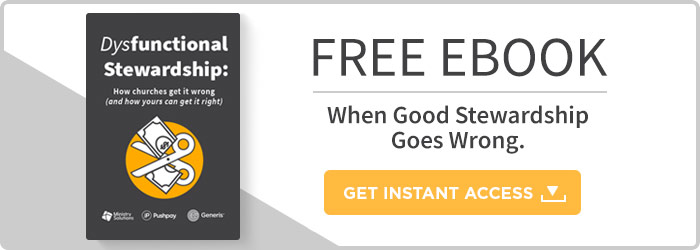
How to Have a Stewardship Talk without Making It Awkward
Talking about money is challenging. To ease awkwardness, we've compiled tips to make such talks more approachable. Here's how to create a stewardship talk:
There aren’t many discipleship issues more important than money, possessions, and generosity. Jesus makes it clear that money seeks to usurp Christ’s position in our hearts, and he does so in a culture so much less affluent than ours.
“No one can serve two masters, for either he will hate the one and love the other, or he will be devoted to the one and despise the other. You cannot serve God and money.”
–Matthew 6:24
As pastors, we have the unique responsibility to speak wisdom and direction into the lives of the people God puts in our care.
Talking about Money Is Difficult
Unlike other Christian disciplines, the topic of giving can be particularly divisive. Pastors don’t want to seem self-serving or give the impression that all we really care about is money. So we let the pendulum swing too far in the opposite direction and shy away from approaching finances at all.
There can literally be thousands of reasons it would be appropriate for a pastor to approach the topic of finances with someone in their congregation:
- You know of some financial mismanagement
- A lost job is creating financial turmoil
- A spouse is concerned with their mate’s spending
- An individual or family is struggling with debt
- Regular giving has become sporadic or has ceased altogether
- You’re doing regular discipleship mentoring
If someone is going through the motions in regard to their devotional life, it will often show up in their finances. That’s the one area where it’s just too hard to fake.
So it is important that clergy, ministers, and church leaders feel comfortable speaking into that area. Here are three tips to help these kinds of discussions go off without a hitch:
1. Set the foundation long before you have the conversation
You can set the tone of this discussion before it ever begins. It starts by creating a culture that emphasizes the importance of giving and the dangers of materialism.
If your congregation sees your passion for generosity and understands why it’s important for you, they won’t be surprised when it comes up in conversation. If you’re looking for biblical and historical resources to help you set the tone, check out the blog posts: 20 Bible Verses about Tithing and 6 Views on Tithes and Offerings in the Early Church.
On top of the culture you create, it’s important that you create deep relationships. It might sound silly and obvious, but trust is the key to stopping individuals from feeling threatened and defensive. Pastors are so busy that they struggle to create the kinds of relationships they need with people. If you can sense that a conversation like this is coming, invest in that relationship ahead of time.
To your congregation, knowing how the church feels about generosity and that you’re a safe person can go a long way.
2. Focus on your main objective
Once someone begins to feel uncomfortable in any conversation, the other person will generally follow suit. From there it’s not too hard for the conversation to go off the rails. One way to ensure that you stay comfortable and unruffled is to focus on what you really want out of the dialogue.
Maybe you’re talking to a man in your congregation who is negligent in his child support payments. The ideal conversation would lead him to make some changes and get back on track in this area.
But ultimately, your main objective is that this guy would become more aware of the Spirit’s convicting and prompting. This is something you can definitely help facilitate, but you are under no obligation to force. (What a relief!)
If you’re focused on this one outcome, you won’t end up shifting tactics or goals when you feel like the other person is getting irritated, or you suddenly feel the need to save face. No matter how this conversation goes, you’re one goal is the same at the end as it was when you started.
Too often we know we must have a difficult talk, but we don’t really have an ultimate objective in mind. If you don’t know what you’re wanting from a difficult conversation, don’t have it.
The great thing about knowing that goal is to will this person’s ultimate good, it comes out in your posture and tone of voice.
3. Pay attention to the signs
During your stewardship talk, make sure you’re aware of how the conversation is really going. When we have an end in mind, it can be easy to plow through and not be cognizant of how the discussion is really going.
Is the person engaged in the dialogue? If they’re starting to feel uncomfortable or defensive, they might be withdrawing. A lot of times we take this as a sign that things are going well, and we just continue with our monologue—completely oblivious to the fact that they’ve checked out and are getting resentful.
Another sign that they’re feeling uneasy is that they get more animated and aggressive. While it’s easier to see that things aren’t going well, it can go from bad to worse quickly. Once we’ve allowed it to get to the point, we can lose sight of the goal and find that we’re arguing about ridiculous and non-essential issues.
If you see the stewardship talk is taking a turn for the worse, don’t sugarcoat your point or abandon the conversation altogether. It’s time to step out of the discussion and make the dialogue safe again.
The conversation should resume until you can answer these questions:
- Does this person feel valued?
- Does this person genuinely know that I want the best for them?
- Does this person know that I respect them?
- Does this person know I care about their goals and situation?
When you feel like you can answer yes to these questions, you’re ready to pick up the dialogue again.
Take Responsibility for the Discussion
“Do not lay up for yourselves treasures on earth, where moth and rust destroy and where thieves break in and steal, but lay up for yourselves treasures in heaven, where neither moth nor rust destroys and where thieves do not break in and steal. For where your treasure is, there your heart will be also. Do not lay up for yourselves treasures on earth, where moth and rust destroy and where thieves break in and steal, but lay up for yourselves treasures in heaven, where neither moth nor rust destroys and where thieves do not break in and steal. For where your treasure is, there your heart will be also.”
Matthew 6:19–21
Jesus links our belongings (treasure) with our hearts (priorities). It’s important that we’re resolved to not shy away from this potentially volatile issue. In the end, the truth about our spiritual commitment is quickly revealed in the way we handle our resources.
The trick to soul care is in learning to have high-stakes conversations where people can feel comfortable and safe.






